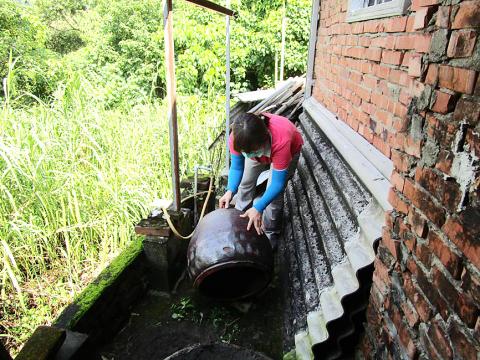The Centers for Disease Control (CDC) yesterday confirmed the ninth indigenous case of dengue fever in Tainan, saying it suspects that the virus might have spread farther, as the latest case involves a person who had not been to areas linked to previous cases.
An 89-year-old man living in the mountainous Ronghe Borough (榮和) of Zuojhen District (左鎮) developed a fever on Wednesday, the centers said.
On Friday, he was taken to a hospital for a scooter-related injury and tested positive in a rapid dengue fever screening before being confirmed to have contracted the disease, the centers said.

Photo provided by the Tainan Public Health Bureau
The man usually stays at home and tends his vegetable garden and he had not traveled abroad or visited areas linked to the eight previous indigenous cases, the CDC said, adding that he visited Shanhua District (善化) on Sunday last week.
Disease prevention personnel would disinfect the man’s home and garden, the centers said, adding that it is investigating where he might have contracted the disease and whether the virus is the same strain as the previous cases.
CDC Deputy Director-General Chuang Jen-hsiang (莊人祥) said a possible source of infection could be someone visiting Zuojhen before the onset of symptoms, or there could be local residents who contracted the disease abroad, but did not show symptoms.
A total of 48 indigenous dengue fever cases had been reported nationwide as of yesterday — 39 in Kaohsiung and nine in Tainan — and there were 209 imported cases, marking the highest number for the period in 10 years, the CDC said.
As heavy rain or showers have been forecast for most of southern Taiwan this week, the centers urged people to remove standing water in containers or drenches in their living environments following rain to eliminate breeding grounds for mosquitoes, and immediately seek medical help if symptoms of fever, headache, pain behind the eyes, rashes, or muscle and joint pain occur.
Dengue fever is a mosquito-borne tropical disease.
Symptoms typically begin three to 14 days after infection.

An essay competition jointly organized by a local writing society and a publisher affiliated with the Chinese Communist Party (CCP) might have contravened the Act Governing Relations Between the People of the Taiwan Area and the Mainland Area (臺灣地區與大陸地區人民關係條例), the Mainland Affairs Council (MAC) said on Thursday. “In this case, the partner organization is clearly an agency under the CCP’s Fujian Provincial Committee,” MAC Deputy Minister and spokesperson Liang Wen-chieh (梁文傑) said at a news briefing in Taipei. “It also involves bringing Taiwanese students to China with all-expenses-paid arrangements to attend award ceremonies and camps,” Liang said. Those two “characteristics” are typically sufficient

A magnitude 5.9 earthquake that struck about 33km off the coast of Hualien City was the "main shock" in a series of quakes in the area, with aftershocks expected over the next three days, the Central Weather Administration (CWA) said yesterday. Prior to the magnitude 5.9 quake shaking most of Taiwan at 6:53pm yesterday, six other earthquakes stronger than a magnitude of 4, starting with a magnitude 5.5 quake at 6:09pm, occurred in the area. CWA Seismological Center Director Wu Chien-fu (吳健富) confirmed that the quakes were all part of the same series and that the magnitude 5.5 temblor was

The brilliant blue waters, thick foliage and bucolic atmosphere on this seemingly idyllic archipelago deep in the Pacific Ocean belie the key role it now plays in a titanic geopolitical struggle. Palau is again on the front line as China, and the US and its allies prepare their forces in an intensifying contest for control over the Asia-Pacific region. The democratic nation of just 17,000 people hosts US-controlled airstrips and soon-to-be-completed radar installations that the US military describes as “critical” to monitoring vast swathes of water and airspace. It is also a key piece of the second island chain, a string of

The Central Weather Administration has issued a heat alert for southeastern Taiwan, warning of temperatures as high as 36°C today, while alerting some coastal areas of strong winds later in the day. Kaohsiung’s Neimen District (內門) and Pingtung County’s Neipu Township (內埔) are under an orange heat alert, which warns of temperatures as high as 36°C for three consecutive days, the CWA said, citing southwest winds. The heat would also extend to Tainan’s Nansi (楠西) and Yujing (玉井) districts, as well as Pingtung’s Gaoshu (高樹), Yanpu (鹽埔) and Majia (瑪家) townships, it said, forecasting highs of up to 36°C in those areas